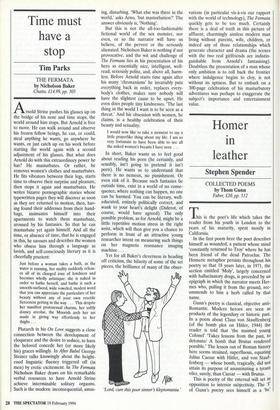Time must have a stop
Tim Parks
THE FERMATA by Nicholson Baker Chatto, £14.99, pp. 305 Arnold Strine pushes his glasses up on the bridge of his nose and time stops, the world around him stops. But Arnold is free to move. He can walk around and observe his frozen fellow beings, he can, or could, steal anything he wants, go anywhere he wants, or just catch up on his work before starting the world again with a second adjustment of his glasses. But what does Arnold do with this extraordinary power he has? He masturbates. Or rather, he removes women's clothes and masturbates. He fits vibrators between their legs, starts time to observe their surprise and pleasure, then stops it again and masturbates. He writes bizarre pornographic stories whose typewritten pages they will discover as soon as they are returned to motion, then, hav- ing found their addresses from their hand- bags, insinuates himself into their apartments to watch them masturbate, aroused by his fantasies. So that he can masturbate yet again himself. And all the time, or absence of time, that he is engaged in this, he savours and describes the women who obsess him through a language as lavish, and self-consciously literary as it is cheerfully prurient:
Just before a woman takes a bath, as the water is running, her nudity suddenly releas- es all of its charged ions of lewdness and becomes wholly artistique: she is naked in order to bathe herself, and bathe is such a smooth-surfaced, wide voweled, modest word that you can appreciate the particulars of her beauty without any of your own erectile fierceness getting in the way . . . This despite her manifest protosexual charms, her softly domey areolae, the Moorish arch her ass made in giving way effortlessly to her thighs .. .
Plutarch in his On Love suggests a close connection between the development of eloquence and the desire to seduce, to have the beloved concede her (or more likely his) graces willingly. In After Babel George Steiner talks knowingly about the height- ened linguistic fluency triggered off (in men) by erotic excitement. In The Fermata Nicholson Baker draws on his remarkable verbal resources to have Arnold Strine achieve interminable solitary orgasms. Such is the modern: inconsequential, amus- ing, disturbing. 'What else was there in the world,' asks Arno, 'but masturbation?' The answer obviously is, 'Nothing'.
But this is not the all-too-fashionable fictional world of the sex monster, nor even, or so the narrator will have us believe, of the pervert or the seriously alienated. Nicholson Baker is nothing if not provocative, and the wit and challenge of The Fermata lies in his presentation of his hero as essentially nice, intelligent, well- read, seriously polite, and, above all, harm- less. Before Arnold starts time again after his many `chronanisms' he invariably puts everything back in order, replaces every- body's clothes, makes sure nobody will have the slightest cause to be upset. He even does people tiny kindnesses. The last thing in the world I want is to be seen as a threat.' And his obsession with women, he claims, is a healthy celebration of their beauty and sexuality: I would now like to take a moment to say a little prayerlike thing about my life. I am so very fortunate to have been able to see all the naked women's breasts 1 have seen ...
In short, Baker wants us to feel good about reading his porn (he certainly, and sensibly, isn't going to pretend it isn't porn). He wants us to understand that there is no nemesis, no punishment. Or even risk of it. Because such fantasies lie outside time, exist in a world of no conse- quence, where nothing can happen, no one can be harmed. You can be literary, well- educated, entirely politically correct, and wank to your heart's delight (Diderot, of course, would have agreed). The only possible problem, as for Arnold, might be a little repetitive motion stress in the right wrist, which will then give you a chance to perform in front of an attractive young researcher intent on measuring such things on her magnetic resonance imaging machine ...
Yet for all Baker's cleverness in heading off criticism, the hilarity of some of the set pieces, the brilliance of many of the obser- 'Lord, cure this poor sinner's kleptomania.' vations (in particular vis-a-vis our rapport with the world of technology), The Fermata quickly gets to be too much. Certainly there is a deal of truth in this picture of affluent, charmingly aimless modern man living without parents, wife, children, or indeed any of those relationships which generate character and drama (the scenes with the two real girlfriends are indistin- guishable from Arnold's fantasising). Doubtless the presentation of a man whose only ambition is to roll back the frontier where indulgence begins to cloy, is not without its aptness. But to embark on a 300-page celebration of his masturbatory adventures was perhaps to exaggerate the subject's importance and entertainment value.


















































 Previous page
Previous page